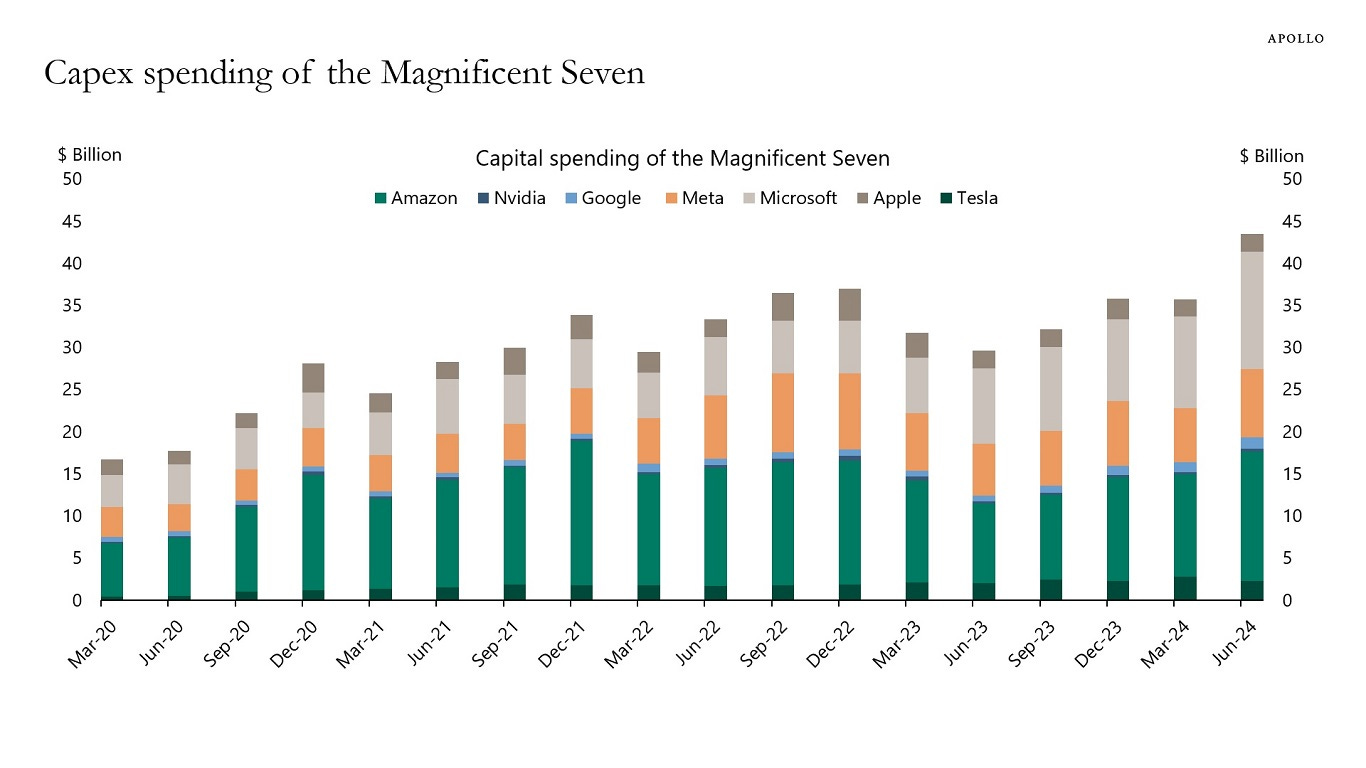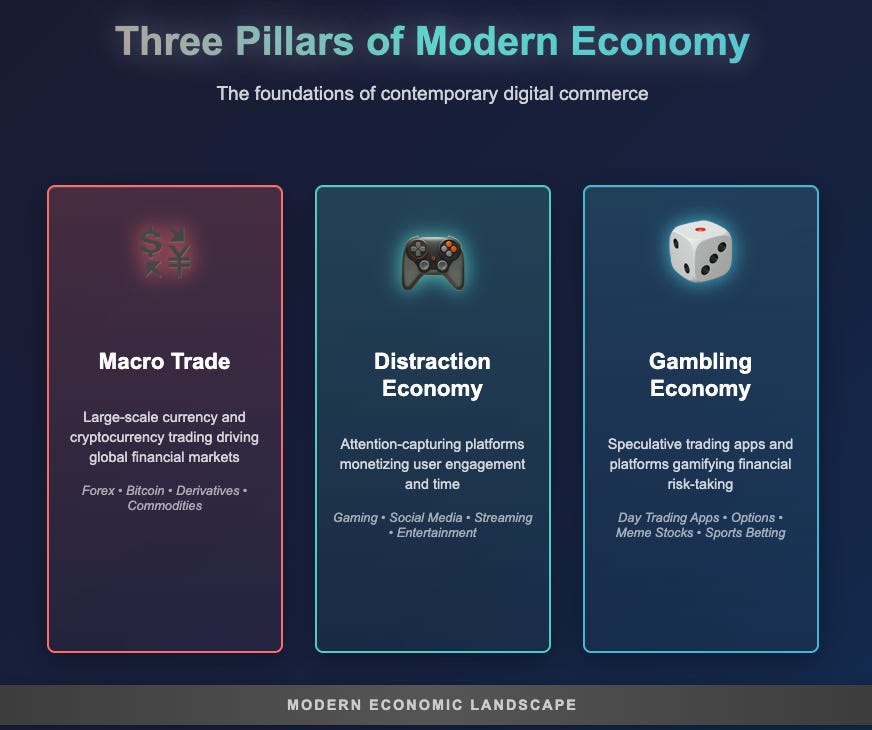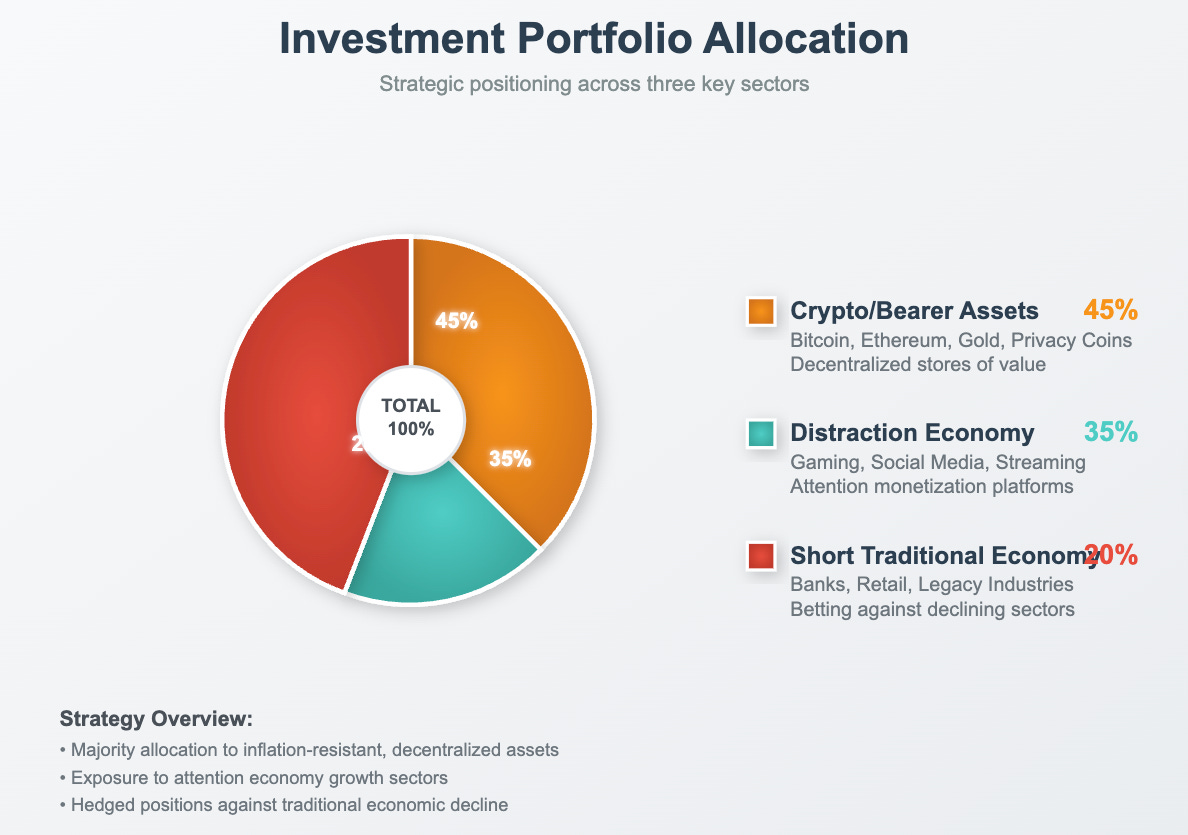Will AI Make Us More or Less Productive?
Ive been thinking about this for a long time now.
While everyone believes AI will revolutionize productivity and transform white-collar work, I think the reality could be starkly different.
I recently did a week of AI labs for my company, touching almost every tool and model on the market today. I coded for 3 days, and I’ve never coded before to that level of functionality before. Albeit basic, it was still highly impressive. That corporate exposure to such a broad set of AI tool sets made me very bullish.
However, I also check my phone every day and use social media. I subscribe to various newsletters and utilize the content regularly to inform a range of decisions. Watching how AI —just in the last 6 months — has gotten all of these streams to be *highly* curated to exactly what makes me tick has been wild. That made me bearish.
AI excels at creating addictive, personalized content but still struggles with above basic business tasks. Ill share some of that below.
So…are we entering the age of AI productivity or are we're entering the age of AI-powered distraction.
And since this account is focused on making money, of course, there's an investment thesis here!
My Number Extraction Problem
When AI tools first emerged, I was making significant money in personal trading by extracting information from 8-Ks and 10-Qs as soon as they were released. I scaled this across multiple stocks and thought, "This is fantastic….AI is going to help me do this job incredibly effectively."
Six months later, I still wasn't getting basic umber extraction right…and honestly you dont need to be a developer to get that right. So I know it wasnt me:)
Keep in mind, number extraction isn't just working with text data—you're dealing with massive text files, PDFs, images, and finding specific strings. Sometimes the data isn't in neatly formatted tables. There's domain knowledge involved in classifying something as, say, a capital expenditure. I wasn't having success using AI for this initially.
Eventually, I started having some success, but it required enormous effort. This was completely different from what the media was saying about AI replacing all white-collar work. I'd been working just trying to extract a couple of numbers from an 8-K—the most basic possible task.
Even today, you can find internal benchmarks running capabilities of models like O3 (my fav model btw!) in web search, going through central bank minutes and transcripts. These are publicly available documents that should be in training data and shouldn't be hard to find—they're literally the most transparent government press releases possible.
Yet I only get about a 35% success rate in extracting the correct number.
If the Bank of Japan says inflation decelerated to 1.35%, the question is: did the AI get that 1.35% right? Not qualitative analysis….just basic quantitative extraction. AI models really struggle with these fundamental white-collar workflows.
Meanwhile, When You Open Your Phone
While AI struggles with basic business tasks, look at what's happening with generative content. Compare the skill and production quality required to make a full-scale video with a production team versus extracting a number from an 8-K. They're radically different in complexity. Yet these AI-generated videos are amazing. They're dominating Instagram and becoming completely untethered from human content. There are viral videos of sharks with three shoes getting 32 million YouTube views.
NOTE: Here at Jarhead Cap, yes, we ar MAGA and absolutely love Trump’s social media team. They are top content providers using these tools.
This will be controversial, but it got me thinking: NVIDIA started as a video game company, and we've reclassified it as powering the future of work. But what if it's still a video game company?
The Origin Of An Investment Thesis
The thesis is simple: AI systems won’t make us more productive….but they will create incredibly engaging, addictive content.
Again, I’m developing this theory from my own experience. I see excellent AI-generated content everywhere. When new GPT models came out, the image generation capabilities were stunning. I found myself in Grok, generating image after image, losing track of time because it was so fascinating. You can create dungeon worlds, interactive landscapes that evolve, and suddenly hours are gone.
The big players are converging to create the best video games ever made:
Generative video
Generative images
Generative characters (NPCs)
Microsoft is already publishing AI-rendered games like generative Quake and Doom. This is the metaverse on steroids—the vision NVIDIA had in 2021 with the omniverse, but now we can actually generate enough compelling content.
The Personalization Layer coming soon with AI Social Media and Ads
Here's where it gets really interesting. I was experimenting with AI tools, trying to render my face onto a Miami Vice scene (dont hate….thats still the best show in the history of TV). So I paid in crypto and created a little video. An hour later, I saw an advertisement with my own face rendered on it. Click play above…I always knew Id look good with his hair!!
BTW, here’s the original:
But they were serving me a personalized ad using my own face!!!
Do you have any idea how much sh** I would by if it was Don Johnson with my face selling it to me. Turbolol. This is an incredible moment in AI and ad targeting capabilities. Personalization in advertising will likely deliver 2-3x better returns than showing everyone the same ad. But what if that personalization was applied to all content?
BTW, META is going to freaking crush it….it might be one of the few non-crypto stocks I load up on again,
Previously, the metaverse was a world that looked the same to everyone. Now these generative worlds will be personalized just for you. Imagine Roblox with NPCs that are genuinely interesting to engage with, live-rendered content tailored specifically to you or your kids, using chat history and memory.
Memory was the final piece for personalization, which is why it's Sam Altman and OpenAI's biggest focus. We see memes about people chatting with AI girlfriends, and when AI companions run out of context and forget conversations, it's socially frustrating to users.
This tells us people are using these tools as social replacements, like talking to trusted friends. This is also why Meta and Zuckerberg are offering staggering dollars to recruit the top AI developers.
The Sexuality Factor
When you layer sexuality into this technology, it becomes incredibly powerful. People are already engaging with AI girlfriends and chatbots. Add generative video, and you'll have generative romantic partners…..the Blade Runner scenario where someone says, "Oh, you're one of those guys who only likes AI women." Lololo….I cant believe were finally at that stage. It was so crazy when I watched that movie back then.
Now, since we’ve been around the block a few times with the female species (have you seen Marines in their dress blues? Exactly.) we know from experience that women's sexuality is more verbal and emotional than males. They will be very affected by AI-generated romance novels and text-based interactions. For men who are more novelty-seeking, the ability to generate new experiences will be extremely addictive, with gamified hunting attributes.
So lets go back to the beginning. On the consumer side of AI its creating the possibility of fully immersive, potentially sexual worlds on one side, while on the other corporate side, we still can't extract basic financial information from documents. All of this will iterate fast, but hmmmm…..
The Musical.ly Moment
There's an older anecdote I absolutely love about Musical.ly (TikTok's predecessor many of you probably never heard of). The founder was running an musical education startup, nearly broke, riding the subway in China. He decided to observe what people were actually doing on their phones. He asked himself: "Is anybody learning? Is anyone on this train trying to educate themselves?"
He realized nobody was on Wikipedia or consuming enriching content—they were all just scrolling.
BTW TikTok was born shortly afterward.
Are we're having a TikTok moment with AI? The narrative was education and productivity, but we're pivoting to entertainment and distraction.
The Macro Economics Don't Add Up
Microsoft's Satya Nadella originally said he needed “10% GDP growth to justify AI CapEx”. These data centers are extremely expensive and might consume 10% of the nation's energy. There's talk of building nuclear power plants just to power AI systems.
Now that GDP has been revised well below 2% for next year, why is CoreWeave stock going parabolic? Why are their GPU reservations completely booked four years out? Is its not Microsoft buying, who?
The answer is the macro view of my (potential) investment thesis
These systems are built by video game companies (NVIDIA, Meta, Tencent) and will consume massive electricity making us addicted to generated worlds.
People's screen time is already extremely high. Roblox is successful without heavy AI integration. When you add AI to algorithms like TikTok's, engagement improves dramatically.
We have huge demand for AI systems (evident in CoreWeave's numbers and NVIDIA's stock performance), but Microsoft isn't pulling back on CapEx investments. Yet productivity isn't accelerating because GDP growth isn't being revised upward.
If AI agents were replacing significant numbers of workers, allowing people to do more interesting work and expanding margins in the administrative white-collar economy, we'd see GDP acceleration. That's simply not happening.
BTW, next week you’re going to see *massive* layoffs at Microsoft. Shhhh, its not public yet. But could it be because they have to pay that massive GPU bill? Hmmm….
The Investment Thesis
This leaves us in an interesting position. I'm proposing an alternative view:
We're turning the entire world into a video game, and that's what AI will accomplish.
The world is already being gamified, and AI will accelerate this. That's why GDP numbers are being revised downward, why gold is rising, and why debt problems aren't being solved. AI isn't fixing society's problems—it's accelerating existing trends toward more addictive content.
Most ETFs are productivity bets, saying tech will make society better. I've noticed they've all underperformed the NASDAQ over the last five years. ARK has lagged by about 90% with higher beta. The genomics sector hasn't performed well, despite Jensen Huang hyping AI's potential there.
The Three-Pillar Strategy
The trade would have three parts:
1. The Macro Trade
Society's productivity isn't increasing despite massive investment and subsidies. But the investment must continue for national security reasons (the AI race), which is why NVIDIA has gone parabolic. You essentially have currency debasement (don’t forget to buy Bitcoin) + declining productivity + a boost in risk assets.
That means crypto bets (which benefit from AI accelerating their roadmaps) hedged with fiat currencies that are printed to finance this system.
But when it comes to Bitcoin vs stocks (on a 1yr, 3yr, 10yr time horizon) just read this from Claude to know why it’s impossible to ignore in any macro trade thesis:
Good luck picking the right stocks vs just sitting in BTC!!
2. “Long” the Distraction Economy
Everything related to generative AI content will see a massive improvement in product profiles. The leap from original video to TikTok will happen across every digital product. Everything will become more addictive.
People will pay substantial amounts for these services—I expect many paying $200+ monthly for AI like ChatGPT or Claude because they want constant access. Like hard drugs being expensive because they're powerful, AI products will command premium pricing with great margins and government subsidies.
3. The Gambling Economy
The resulting society will be extremely unequal due to network effects. AI research labs raise $10 billion seed rounds pre-product while average people struggle to find jobs. This "Squid Game" dynamic combined with addictive advertising will drive money into gambling…the crypto + Robinhood dynamic, options trading, and increasingly esoteric financial products. The world’s casino. Open 24/7.
What Won't Work
Whenever you make an investment thesis, you need to frame what absoltuely *won’t work* into that equation to keep some clear invalidation/guardrails.
I dont think most AI strategies have “a short” component. Shorting Nvidia or Coreweave is insane….trust me, I learned that with Tesla years ago.
So what if you short the regular economy based on these varibales?
Interest rates will stay high
Workers will be less productive
AI won't necessarily make actual work more productive
Mid-caps and small-caps won't perform well
Automation will face political resistance. Trump's position on dock automation is very telling (and actually one I disagree with). He opposed it despite potential efficiency gains because it would result in job losses. So what if politicians *wont* allow AI to replace humans at scale? Hmmm…..
If these variables do change they I would have to change my mind. But these are things I can track.
The Final Element: AI Influence on Markets
Because people spend extensive time with AI systems, new memes and concepts will pop up everywhere.
Crypto started this with memes like DOGE and my beloved DogWifHat ($10 and we go to Ibiza!!). Shout out WIF.
But LLMs have a "mode collapse" property at temperature zero…meaning they develop predictable biases that cause asset prices to move.
This creates opportunities to predict where bubbles and narratives will form, as AI itself influences human thinking in measurable ways. Hmmm……
How to Position Yourself
So….the thesis suggests:
AI will create generative worlds that decelerate productivity
GDP growth will remain sub-2% despite claims otherwise
Bearer assets (Bitcoin, Crypto) will outperform debt-based currencies
The distraction economy will thrive while the traditional economy struggles
Massive investment bubbles will form, influenced by AI systems themselves
Ironically, this could be an exciting time if you maintain discipline. There's enormous money on the table for those who don't get addicted to these products and can maintain self-control……something most of you civilian people lack haha! Dont worry, the Jarhead is on it.
I'm spending significant time figuring out how to avoid getting my own brain "cooked" by these systems while capitalizing on the opportunities they create. Its super hard as my company builds these lol. But honestly, thats what everyone in the world is dealing with now.
The goal is to make money in this new world while funneling those gains into genuinely productive endeavors.
NOTE: Every graphic in sourced ChatGPT or Claude.
It's not lost on me that this investment thesis represents a contrarian view that AI's primary impact will be entertainment and distraction rather than productivity enhancement. But being contrarian is where you make THE most money. Just like when I started buying this thing everyone called stupid in 2016…..called Bitcoin.
Think different.
Semper Fi
JJ













Love the contrarian POV. I've experienced the same challenges every time I try to use AI to solve more complex efficiency problems, mostly around stock analysis. I've spent hours working on models and have little faith in the output. However, I certainly see the entertainment factor!
I’ve been thinking about the distraction economy as well. Holding someone’s attention, people paying for your attention, you paying for others. Check out orb.land for a good example (project by Eric Wall).
Thanks for the post, I enjoyed it & found it insightful.